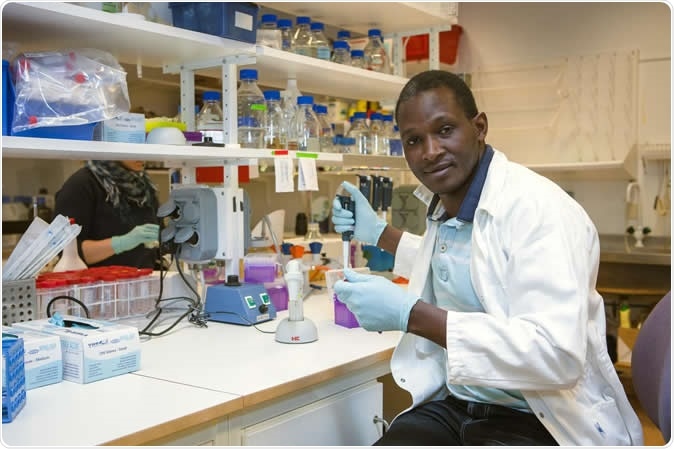Pneumonia is a lung infection, filling up the alveoli with pus and fluid. At present, it’s the leading cause of death among children. The lung infection accounts for 15 percent of all deaths in children below five years old, killing more than 800,000 children in 2017 alone.
It’s not just a lung infection among children, but for adults, too. Vulnerable populations are at a higher risk of acquiring pneumonia, namely older adults, infants, children, pregnant women, and those with a weakened immune system.
In a new study published in the journal Nature Communications, a team of researchers at Umeå University and Stockholm University, Sweden, found that bacteria use hydrogen peroxide to attack and weaken the immune system, causing pneumonia.
The study shows that the bleaching agent is potent enough to fight and defeat the body’s immune system. The body uses the same compound to fight bacteria, hence, showing that bacteria are now using the same agent the body uses in the fight.

Nelson Gekara in the lab. Image Credit: Mattias Pettersson
What is hydrogen peroxide?
It’s a common bleaching agent used in a plethora of applications such as teeth whitening, hair dyes, disinfecting wounds, cleaning surfaces, and even as a stain remover. It’s a ubiquitous metabolic byproduct of aerobic unicellular and multicellular organisms that play a pivotal role in determining host-microbial interaction outcomes.
In the past studies, all focused on the endogenous hydrogen peroxide produced by the immune cells and its role in killing pathogens or driving inflammatory processes. However, the new study reveals that microbes themselves, produce the compound, thus, fighting fire with fire.
"By using hydrogen peroxide to defeat the immune system, you could say that the bacteria are fighting fire with fire. The body itself also produces hydrogen peroxide as a defence against the bacteria. Therefore, it was surprising to see that many types of bacteria use the same substance to overcome the body´s defences," research leader Nelson Gekara said in a statement.
Targeting a key component of the immune system
The researchers focused on Streptococcus pneumoniae or pneumococcus, is the most common type of bacteria that cause pneumonia. Aside from the lung infection, this pathogen also causes other infections in the body, including severe sepsis and meningitis, a potentially fatal inflammation of the meninges found in the brain.

Streptococcus pneumoniae. Gram-positive coccus shaped pathogenic bacteria. - Illustration Credit: Tatiana Shepeleva / Shutterstock
The bacteria may also be present in the respiratory tract of people as part of their normal flora, which means they lay there dormant, not causing any symptoms of infection. The bacteria aim to attack the immune system and the body undetected, and they do this by not triggering an inflammatory response. When the immune system detects the pathogen, it launches an attack to eliminate the disease-causing bacteria and spare the body from harm.
However, in the study, the researchers discovered that pneumococcus and other bacteria target a key component of the immune system, protein complexes called inflammasomes. Inflammasomes act upon foreign bodies or molecules upon detection, and initiate actions to kill these microbes.
In their experiments in mice models, they found that the said bacteria release large quantities of hydrogen peroxide, causing the inactivation of inflammasomes, hence, weakening the immune system.
During the experiment, the investigators observed that the bacteria that were designed to produce less hydrogen peroxide did not affect inflammasomes, provoking a faster and more efficient inflammatory response. As a result, the immune system eradicated the bacteria from the lungs.
Therefore, by vaccinating the mice with catalase, a special enzyme that breaks down hydrogen peroxide hastens the immune response by eliciting inflammation and inflammatory symptoms. As a result, the immune system hastens its inflammatory response, eradicating the bacteria more effectively.
"Our study demonstrates that hydrogen peroxide is an inhibitor of an important component of the inflammatory machinery suggesting that the mechanism we have uncovered is a common strategy employed by many microbes to thrive within us," Saskia Erttmann, first author in the study and former member of Nelson Gekara's research group, said.
"One of the best-known substances with the ability to neutralize hydrogen peroxide and that could hence boost anti-bacterial immunity are vitamins such as Vitamin C found in fruits. Perhaps the adage 'an apple a day keeps the doctor away' is not off the mark," he adds.
Journal reference:
Erttman, S., and Gekara, N. (2019). Hydrogen peroxide release by bacteria suppresses inflammasome-dependent innate immunity. Nature Communications. https://www.nature.com/articles/s41467-019-11169-x